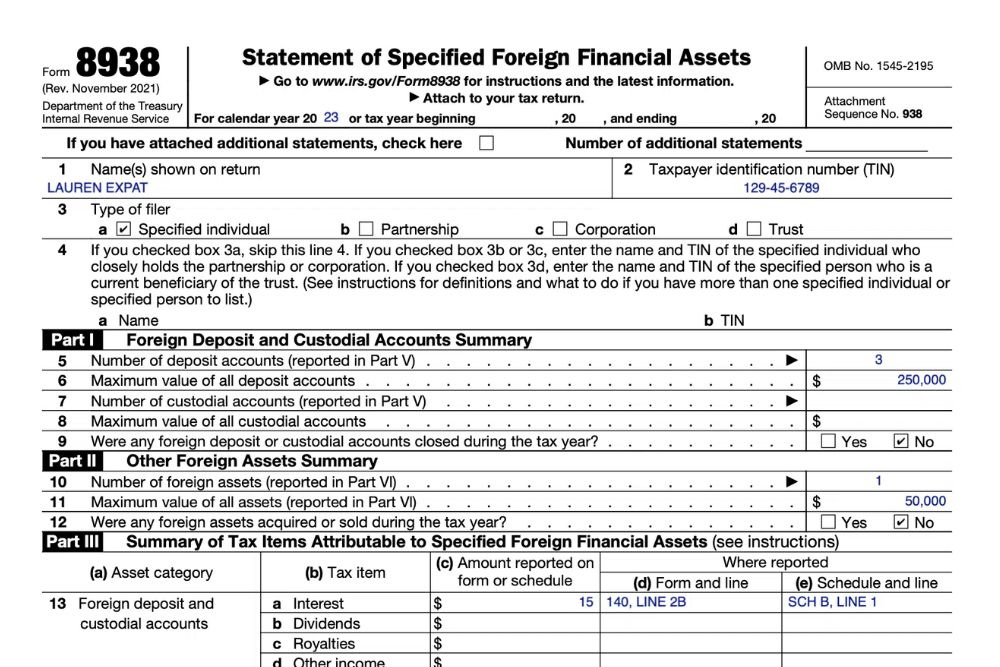FBAR vs FATCA: Which Foreign Account Reporting Do I Need?

- What's the Real Difference Between FBAR and FATCA?
- Do I Need to Comply with FBAR Only?
- Do I Need to Comply with FATCA Only?
- Do I Need to Comply with Both FBAR and FATCA?
- What Are the Critical Differences Between FBAR and FATCA?
- How Do I Know Which Requirement(s) I Need to Meet?
- What Happens If I've Already Missed These Requirements?
- What Are the Penalties for FBAR and FATCA Non-Compliance?
- Can I Reduce My US Tax Bill Even If I Meet These Requirements?
- What Should I Do Next?
If you’re an American with foreign bank accounts, you’ve probably encountered two confusing acronyms: FBAR and FATCA. Many expats assume these are the same thing or that complying with one covers both requirements. According to FinCEN’s latest data, over 1.2 million FBARs are filed annually, yet many Americans abroad still don’t realize they may need to comply with both FBAR and FATCA.
Here’s what makes this confusing: both FBAR and FATCA require reporting foreign financial holdings to the U.S. government. Both aim to prevent tax evasion. Both carry severe penalties for non-compliance. But they’re separate requirements with different thresholds, deadlines, and filing procedures.
What’s the Real Difference Between FBAR and FATCA?
FBAR and FATCA are two distinct reporting requirements for U.S. citizens and residents with foreign financial assets. While they often overlap, they serve different purposes and have different rules.
FBAR (Foreign Bank Account Report) focuses exclusively on foreign financial accounts you have an interest in or authority over. You report FBAR by filing FinCEN Form 114.
FATCA (Foreign Account Tax Compliance Act) covers a broader range of foreign financial assets beyond just accounts. You comply with FATCA by filing Form 8938 with your tax return.
Here’s the essential difference: FBAR catches foreign accounts. FATCA catches foreign accounts AND other foreign assets like stocks, partnerships, and investments held outside accounts.
| Comparison Point | FBAR | FATCA |
| What you report | Foreign financial accounts only | Foreign financial accounts AND other foreign assets |
| Filing form | FinCEN Form 114 | Form 8938 |
| Who receives it | FinCEN (Treasury Department) | IRS (with your tax return) |
| Threshold | $10,000 aggregate at any time | $50,000-$600,000 depending on status |
| Where filed | BSA E-Filing System (separate) | Attached to Form 1040 |
| Deadline | April 15 (auto-extension to October 15) | April 15 (auto-extension to October 15) |
| Penalties | Up to $16,536 per non-willful violation | $10,000 initial, up to $50,000 continued |
Do I Need to Comply with FBAR Only?
You’ll need FBAR compliance, but not FATCA, when your foreign accounts exceed $10,000, but your total foreign assets stay below the FATCA threshold.
Example: Digital nomad with basic banking
Marcus is single and travels full-time. He has $35,000 in a Thai bank account and $15,000 in a Mexican account. His total foreign accounts ($50,000) exceed the FBAR threshold but fall below the $200,000 FATCA threshold for single expats abroad.
Marcus needs: FBAR only.
Example: Married couple with modest savings
Jennifer and Tom reside in Spain and file their taxes jointly. They have €45,000 ($49,000 USD) in a Spanish savings account. This exceeds the $10,000 FBAR threshold but stays well below the $400,000 FATCA threshold for married expats filing jointly abroad.
Jennifer and Tom need: FBAR only.
Do I Need to Comply with FATCA Only?
You’ll need FATCA compliance, but not FBAR, when you have specified foreign financial assets that aren’t foreign accounts, or when your foreign assets exceed FATCA thresholds, but you never had $10,000 in foreign accounts.
Example: Stock investor living in the U.S.
Rachel lives in California and directly owns shares in a German company (not held in any brokerage account) worth $85,000. She has no foreign bank accounts. She exceeds the $50,000 FATCA threshold for U.S. residents but doesn’t meet the $10,000 FBAR threshold because she has no foreign accounts.
Rachel needs: FATCA only.
This scenario is relatively rare. Most expats who exceed FATCA thresholds also have foreign bank accounts that trigger FBAR requirements.
Do I Need to Comply with Both FBAR and FATCA?
This is the most common situation for expats with substantial foreign holdings. You’ll need both when your foreign accounts exceed $10,000 AND your total foreign assets exceed the FATCA threshold.
Example: Corporate expat with comprehensive finances
Sarah is single and works in London. She has:
- £120,000 in a UK bank account ($156,000 USD)
- £80,000 in a UK investment account ($104,000 USD)
- Company stock options worth $55,000
Her total foreign assets ($315,000) exceed both the $10,000 FBAR threshold and the $200,000 FATCA threshold for single expats abroad.
Sarah needs: Both FBAR and FATCA compliance.
Example: Retired couple with foreign pension
David and Linda retired to Portugal and filed jointly. They have:
- €180,000 in Portuguese bank accounts ($196,000 USD)
- €220,000 in a Portuguese private pension ($240,000 USD)
Their total foreign assets ($436,000) exceed both the $10,000 FBAR threshold and the $400,000 FATCA threshold for married expats filing jointly abroad.
David and Linda need: Both FBAR and FATCA compliance.
Although some assets must be reported under both requirements, you must file both forms separately. Complying with one doesn’t exempt you from the other.
What Are the Critical Differences Between FBAR and FATCA?
Assets Covered: Accounts vs. Broader Assets
FBAR only reports foreign financial accounts, including checking, savings, and investment accounts, as well as certain pensions and life insurance policies.
FATCA reports all specified foreign financial assets, including:
- Everything FBAR covers, plus
- Foreign stocks and securities held directly (not in an account)
- Foreign partnership interests
- Foreign hedge fund and private equity fund interests
- Foreign options and derivatives
- Beneficial interests in foreign trusts
Why this matters: You might have foreign stocks purchased directly from a company that needs FATCA reporting but not FBAR reporting.
Signature Authority: A Key FBAR Distinction
FBAR requires reporting accounts where you have signature authority, even if you don’t own them. This commonly affects:
- Business owners who can sign on the company’s foreign accounts
- Employees with signing authority on employer accounts
- Adult children who can sign on to their elderly parents’ accounts
- Executors managing estate accounts
FATCA only requires reporting assets you own or have an interest in, not accounts where you merely have signature authority.
Example:
Maria works for a U.S. company with a German subsidiary. She can sign on the subsidiary’s German bank account (€200,000 balance) but has no ownership interest. She also has her personal German account with €8,000.
Maria’s requirements: FBAR (reports both the company account and her personal account, totaling over $10,000). No FATCA (she doesn’t own the company account, and her personal assets are below the threshold).
Thresholds: Fixed vs. Variable
FBAR has one universal threshold: $10,000 aggregate at any point during the year. It doesn’t matter if you’re single, married, living abroad, or living in the U.S.
FATCA thresholds vary significantly:
For expats living abroad (most readers of this article):
- Single: $200,000 year-end OR $300,000 anytime
- Married filing jointly: $400,000 year-end OR $600,000 anytime
- Married filing separately: $200,000 year-end OR $300,000 anytime
For U.S. residents:
- Single: $50,000 year-end OR $75,000 anytime
- Married filing jointly: $100,000 year-end OR $150,000 anytime
- Married filing separately: $50,000 year-end OR $75,000 anytime
Critical distinction: FBAR uses only the maximum balance at any time during the year. FATCA uses TWO tests (year-end AND anytime), and you must comply if you exceed either threshold.
Filing Location: Separate Systems
This is where many expats make mistakes. FBAR and FATCA go to entirely different places:
- FBAR: Filed electronically through the BSA E-Filing System at fincen.gov. It’s never attached to your tax return. FinCEN (Financial Crimes Enforcement Network) receives it, not the IRS.
- FATCA: Filed as Form 8938 attached to your regular tax return (Form 1040) with the IRS. If you e-file your return, FATCA reporting is included electronically. If you have a paper file, it’s physically attached.
What this means: Even if you file FATCA reporting with your tax return, you still need to file FBAR through FinCEN if you meet that requirement separately. They don’t communicate with each other.
How Do I Know Which Requirement(s) I Need to Meet?
Use this decision tree to determine your requirements:
Step 1: Did your foreign financial accounts exceed $10,000 in aggregate at ANY point during the year?
- Yes → You need FBAR. Continue to Step 2.
- No → No FBAR required. Continue to Step 2.
Step 2: Are you required to file a U.S. tax return?
- Yes → Continue to Step 3.
- No → No FATCA required (even if your assets exceed thresholds). Stop here.
Step 3: What’s your filing status, and where do you live?
- Single, abroad: Assets exceed $200,000 year-end OR $300,000 anytime? → Need FATCA
- Single,U.S..: Assets exceed $50,000 year-end OR $75,000 anytime? → Need FATCA
- Married filing jointly, abroad: Assets exceed $400,000 year-end OR $600,000 anytime? → Need FATCA
- Married filing jointly,U.S..: Assets exceed $100,000 year-end OR $150,000 anytime? → Need FATCA
Your result: You now know if you need FBAR only, FATCA only, both, or neither.
What Happens If I’ve Already Missed These Requirements?
If you realize you should have been complying with FBAR or FATCA in previous years, relief programs are available. The approach depends on your specific situation:
For late FBAR only: The Delinquent FBAR Submission Procedures may eliminate penalties if your tax returns are current and your failure was non-willful.
For both late tax returns and FBAR/FATCA: The Streamlined Filing Compliance Procedures allow you to catch up with reduced or eliminated penalties. This program was specifically designed for expats who were unfamiliar with their filing requirements.
Don’t attempt to “quietly” file past forms without using these procedures. The IRS and FinCEN coordinate data, and filing late without protection can trigger audits and full penalties.
What Are the Penalties for FBAR and FATCA Non-Compliance?
Both requirements carry severe penalties, but the penalty structures differ significantly.
FBAR penalties can be assessed per account or per form, depending on whether the violation was willful or not. Non-willful violations can reach $16,536 per violation (2025 amount). Willful violations can result in the greater of $165,353 or 50% of the account balance per account. Criminal penalties may also apply.
FATCA penalties start at $10,000 for failure to file. If you don’t file within 90 days of receiving IRS notification, you will face an additional $10,000 per month, up to a maximum of $50,000. There’s also a 40% penalty on any tax underpayment related to undisclosed foreiU.S. assets.
Can I Reduce My US Tax Bill Even If I Meet These Requirements?
Yes! The good news is that FBAR and FATCA complianU.S.oesn’t mean you’ll owe U.S. taxes. These are purely informational requirements. Most expats can eliminate orU.S.matically reduce their U.S. tax liability using:
The Foreign Earned Income Exclusion (FEIE): Excludes up to $130,000 of U.S.ign earned income from U.S. taxation (2025 tax year). This is ideal for expats in low-tax countries such as the UAE, Singapore, or Portugal.
The Foreign Tax Credit (FTC): Provides a dollar-for-dollar credit for foreign taxes paid. This works best for expats in high-tax countries like Germany, France, or the UK.
Many expats use these tU.S.enefits to reduce their U.S. tax bill to $0 while still meeting all reporting requirements for FBAR and FATCA.
What Should I Do Next?
The distinction between FBAR and FATCA compliance trips up even sophisticated investors. Here’s what you should do:
- Calculate carefully: Review your foreign account statements for the entire year. The FBAR threshold applies if you exceeded $10,000 for even one day.
- Include everything reportable: Don’t forget to include signature authority accounts for FBAR and non-account assets for FATCA.
- Use the correct exchange rates: ConvertDecember 31rrency to USD using the Treasury’s exchange rate as of December 31.
- File separately: Please note that FBAR and FATCA are submitted to different agencies through seperate systems.
At Greenback, our CPAs and Enrolled Agents specialize in foreign account reporting for Americans abroad. We’ve filed over 71,000 returns and maintain a 4.9-star average across 1,200+ TrustPilot reviews because we get these details right.
Need help determining your filing requirements? Contact us, and one of our Customer Champions will be happy to help. Ready to be matched with a Greenback accountant? click the get started button below.
Stay compliant with FBAR and FATCA
The information provided here is for general guidance only. Foreign account reporting requirements can be complex and vary based on individual circumstances. For specific advice on your situation, consult with a qualified tax professional.


